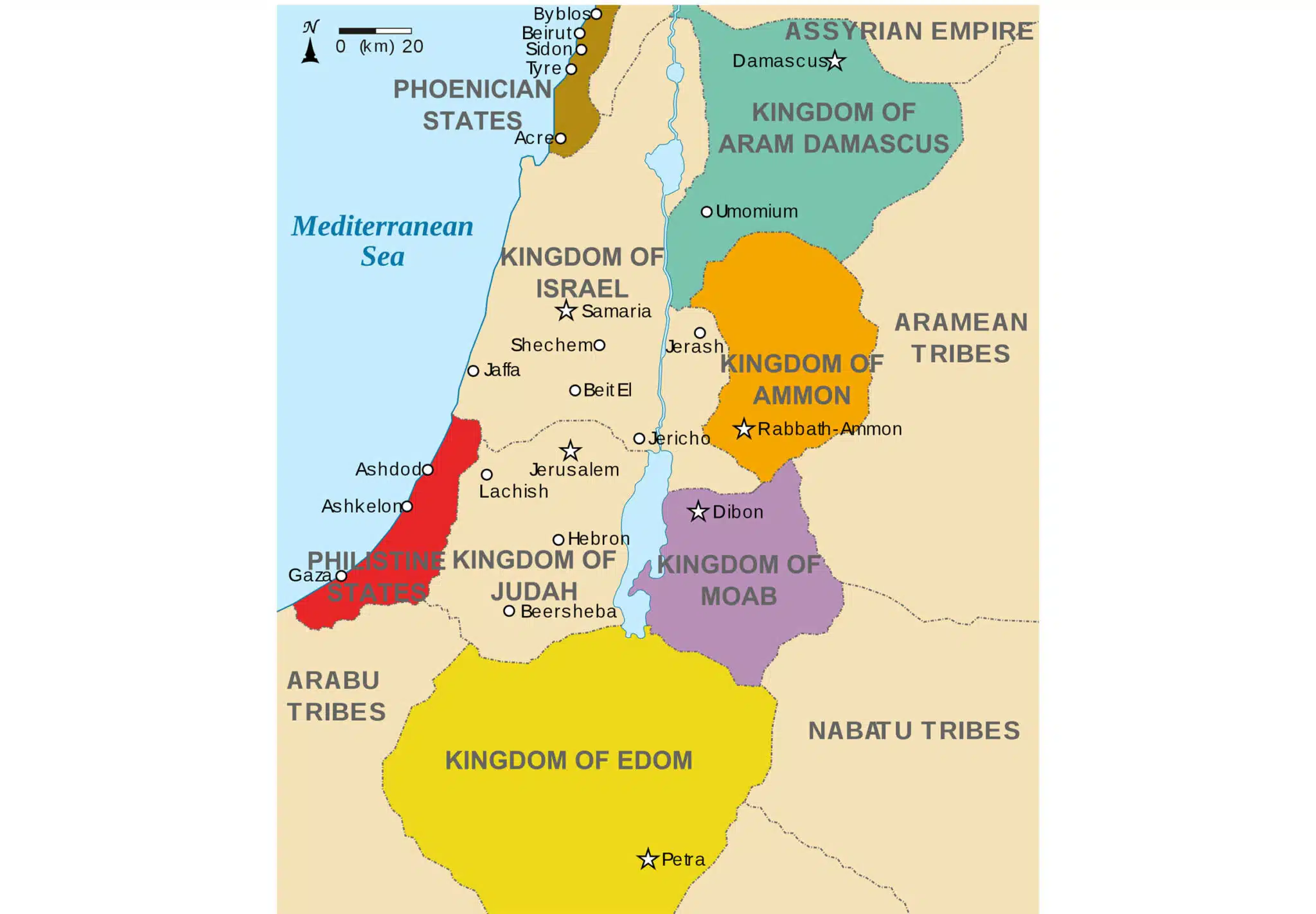The LORD pronounces judgment on the inhabitants of Edom because they pursued their Israelite brothers with the sword.
Next on the list of God’s indictments was Edom, a country located on the eastside of the Jordan River. The prophet stated, Thus says the Lord, ‘For three transgressions of Edom and for fourI will not revoke its punishment.’ The Edomites were kinsmen to the Israelites since they both were descended from Isaac by his twin sons—Esau (Edom) and Jacob (Israel).
Despite their family ties, the Edomites and the Israelites barely displayed brotherly love for one another. In fact, these two people groups were continually fighting against each other throughout most of their history. When the Israelites were at Kadesh, a town on the edge of Edom’s territory, they asked the Edomite king for permission to pass through his land. However, the Edomites “came out” against Israel “with a heavy force and a strong hand” (Numbers 20:20). They denied passage through their territory, causing the Israelites to turn away from them (Numbers 20:17–21). This incident set the stage for a hostile attitude which continued throughout the generations to the time of Amos (see for example, 2 Samuel 8:11–13; 2 Kgs. 8:20–22; 2 Kgs. 14:7).
In the book of Amos, God said He would judge Edom because he pursued his brother with the sword, while he stifled his compassion. This means that the Edomites attacked the Israelites on numerous occasions, and many wars were fought as a result. Amos made it clear when he said that Edom’s anger tore continually, and he maintained his fury forever. Rather than living in peace and helping their Israelite brothers, the Edomites pursued them with the sword, showing no compassion, only anger and hostility.
Consequently, the LORD threatened to send fire upon Teman, which wouldconsume the citadels of Bozrah. The place named Teman was considered the principal city of Edom (Obadiah 9). Since Teman means “south” (Exodus 26:18) it is likely that Teman was in the far south of Edom. The place called Bozrah was the ancient capital of Edom. Some identify it with the modern village of Buseirah, located north of Edom. God’s judgment would thus be so severe that it would destroy the major Edomite cities, from the north to the south, and presumably all points in between.
While we do not have the precise details of when and how Amos’s prophecy concerning Edom was fulfilled, we do know that Edom suffered from several attacks throughout its history. During the reign of King Amaziah of Judah, the Judean army entered into battle with Edom in the valley of Salt, between Beersheba and Arad. With savage brutality, Amaziah “killed of Edom 10,000 and took Sela by war and named it Joktheel” (2 Kgs. 14:7). The land of Edom was made a desolation by the time of Malachi, in the fifth century BC (Malachi 1:3), and was overtaken by the Nabateans, an Arabian tribe, a century later. The Nabateans built the famous tourist destination city of Petra. Today the ancient country of Edom is a part of modern Jordan.
Biblical Text
11 Thus says the Lord,
“For three transgressions of Edom and for four
I will not revoke its punishment,
Because he pursued his brother with the sword,
While he stifled his compassion;
His anger also tore continually,
And he maintained his fury forever.
12 “So I will send fire upon Teman
And it will consume the citadels of Bozrah.”
Check out our other commentaries:
-
Psalm 27:13-14 meaning
God is the very essence of good and David knows he is in God’s good hands...... -
2 Corinthians 2:1-4 meaning
Paul explains why he did not come to Corinth as previously planned. He believed his visit would bring pain to both himself and the Corinthians....... -
Numbers 10:29-32 meaning
Numbers 10:29-32 contains the description of something that happened sometime before the Israelites departed Mount Sinai. It involved Moses trying to convince his brother-in-law Hobab...... -
1 Samuel 17:50-58 meaning
David and Israel are victorious against the Philistines and their champion Goliath....... -
Matthew 20:1-7 meaning
Jesus tells the first half of the parable of the Vineyard laborers. He describes how the landowner continually goes out throughout the day to hire......



